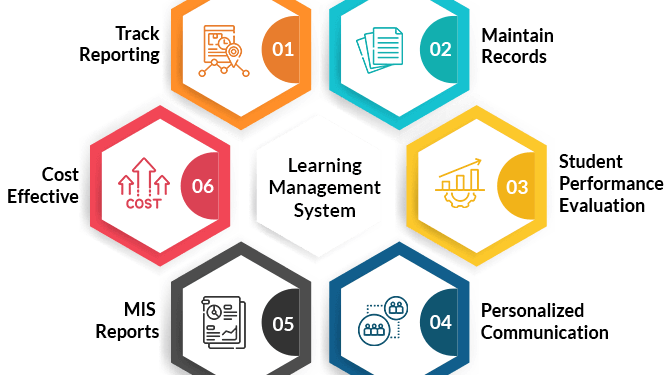In this era of relentless innovation and fierce competition, the imperative to continuously learn and enhance our skills has become paramount. At the forefront of this educational transformation, learning management systems (LMS) wield immense power in reimagining the way we learn. With their cutting-edge capabilities and intuitive interfaces, LMSs empower those in the field of academic training to embrace personalized, interactive, and boundary-breaking studying experiences. By harnessing the transformative power of LMSs, we unlock the door to endless possibilities, enabling us to stay ahead and flourish in this fast-paced digital age.
The Fundamentals of an LMS: Defining Learning Management Systems LMS
Simply put, an LMS is the backbone of modern education, providing a robust platform for seamless and accessible e-learning. On an individual basis, it can provide a person who has nothing but internet access with quality training and skills acquisitions and all of that could be done in a planned and systemized way within the certified school, university, or college. This system brings opportunities. From virtual classrooms to online courses, it revolutionizes standard classroom-based textbook studying by harnessing the power of technology to create immersive and engaging studying spaces.
The Main Advantages of Online Learning Management Systems in Modern Educational Landscape
Flexibility: Ability to adapt to the pace of studying, allowing for personalized and self-directed learning experiences.
Collaboration: LMSs facilitate real-time collaboration and discussions, promoting engagement and active participation.
Availability 24/7
Resource Centralization: All course materials, including documents, videos, and assessments, are stored in one place, making it easy to locate and access resources.
Monitoring the Progress: LMSs enable teachers to monitor studying progress, track the completion of assignments, and provide timely feedback.
Analytics: LMSs provide insightful data and analytics on performance, enabling the identification of the areas for improvement and tailoring instruction accordingly.
Challenges and Considerations in Online Learning
Curriculum Adaptation: Shifting from face-to-face lectures to online formats requires teachers to adapt their curricula, incorporating new strategies and approaches.
Potential for Low Interactivity: Instructors may attempt to directly translate existing support materials into online courses, leading to limited interactivity and engagement if not executed effectively.
While these problems exist, the benefits of online learning and using an LMS frequently outweigh the drawbacks.
With careful planning, effective training, and ongoing support, educators can leverage the benefits of online learning to deliver engaging and impactful studying experiences.
LMS Learning Management System: A Deep Dive into Its Functionality
Now let’s take a closer look at the key LMS functionalities:
Seamless content delivery: Effortlessly access various materials.
Efficient course organization: Easily manage lessons, resources, and assessments within the system.
Collaborative environment: Engage in communication and collaboration through discussion boards and messaging systems.
Streamlined assessment process: Simplify quiz, test, and assignment creation, automated grading, and prompt feedback.
Progress monitoring: Track progress, and assignments, and generate performance reports.
Individualized learning: Adapt learning paths to cater to individual needs and pace.
Enhanced administration: Utilize administrative tools for user management, enrollment tracking, and data analytics.
The Role of an Online Learning Management System in the Era of E-Learning
No matter how much we cherish traditional methods like blackboards and textbooks, the reality of the 21st century imposes different rules. While we may hold nostalgic sentiments, the demands of the modern world require us to harness the power of LMS. These systems provide the infrastructure and tools needed to deliver content for studying, engage learners, and keep track of their progress. Embracing LMS ensures scalability, accessibility, and the ability to adapt to changes in all subjects and academic fields.
Choosing the Right Learning Management System for Your Online Educational Needs
When selecting the right LMS for your online studying needs, consider the following factors:
Features and Functionality: Evaluate the LMS’s capabilities such as content management, communication tools, assessments, progress tracking, and customization options.
Support and Training: Check if the provider offers comprehensive support services, training resources, and user guides.
Compatibility: Ensure the LMS integrates smoothly with your existing technology infrastructure and supports required file formats and integrations.
User-friendly interface that simplifies navigation and enhances the overall experience.
Security and Data Privacy: Prioritize an LMS that implements robust security measures to protect sensitive data and ensures compliance with privacy regulations.
Cost and Pricing Model: Assess the pricing structure, including licensing fees, additional modules, and ongoing maintenance costs.
Scalability: Consider if the LMS can accommodate your growth, such as increasing users, adding courses, and expanding functionalities.
By carefully considering these factors, you can select an LMS that offers the right features, provides adequate support, fits your budget, and aligns with your technological requirements, ensuring a successful e-studying.
The post Reimagining Education: The Power of Learning Management Systems first appeared on BusinessMole.
















